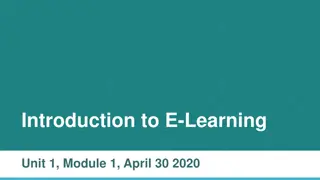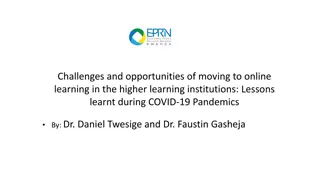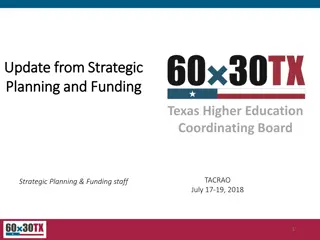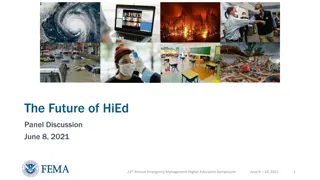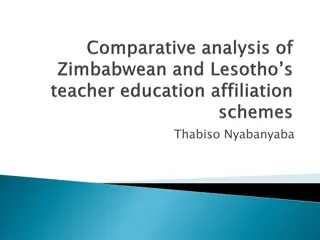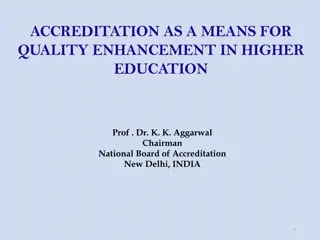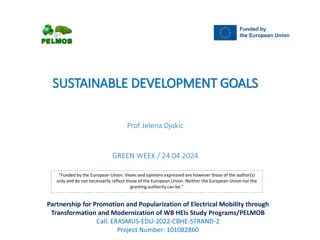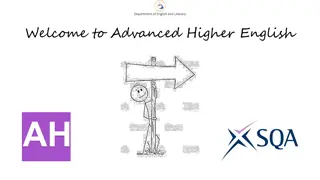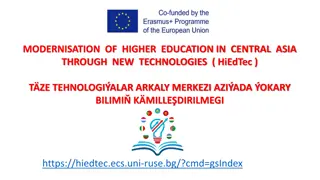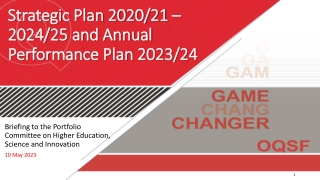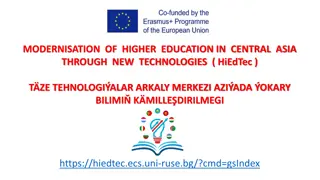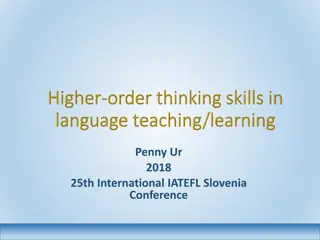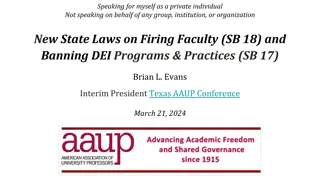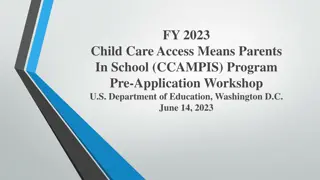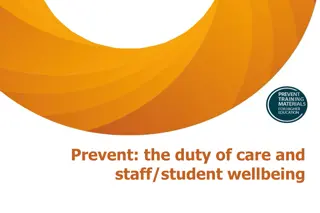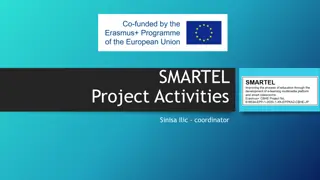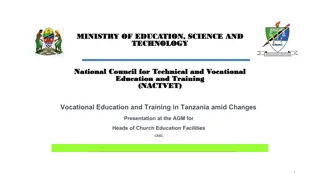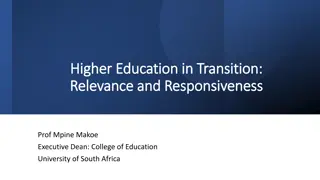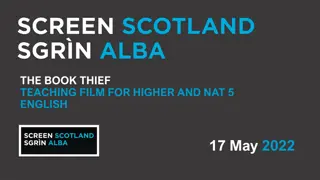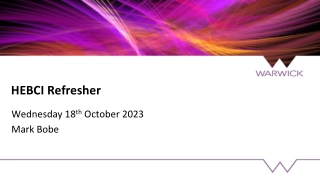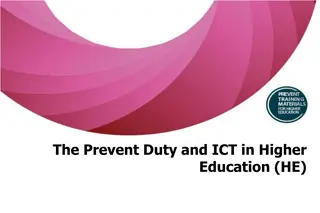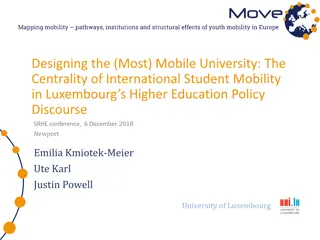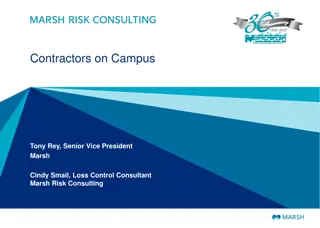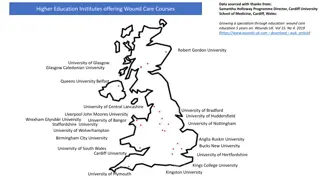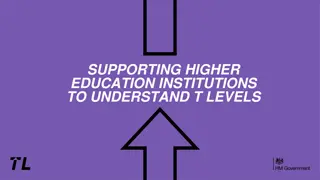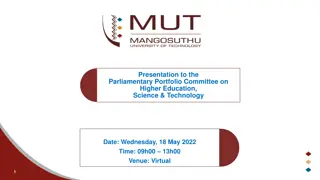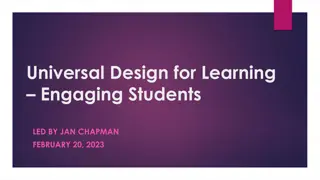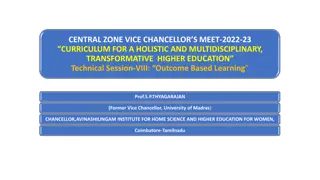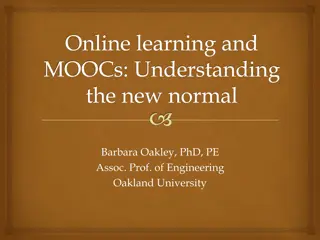Enhancing Higher Education Learning for Modern Challenges
Explore the vision of Teaching and Learning at NUST to tackle contemporary challenges through effective education strategies. Discover insights on fostering student competence and attributes in higher education. Embrace innovation and change to create impactful learning experiences.
Download Presentation

Please find below an Image/Link to download the presentation.
The content on the website is provided AS IS for your information and personal use only. It may not be sold, licensed, or shared on other websites without obtaining consent from the author. Download presentation by click this link. If you encounter any issues during the download, it is possible that the publisher has removed the file from their server.
E N D
Presentation Transcript
Effective Learning in Higher Education to address contemporary challenges Effective Learning in Higher Education to address contemporary challenges By Geoffrey By Geoffrey Shakwa Head: Professional Development E E- -mail: gshakwa@nust.na Shakwa Head: Professional Development mail: gshakwa@nust.na By Maurice Nkusi By Maurice Nkusi Acting Director: Teaching and Learning Unit E E- -mail: mnkusi@nust.na Acting Director: Teaching and Learning Unit mail: mnkusi@nust.na
If you always do what youve always done, you ll always get what you ve always got. Henry Ford Henry Ford To get what we ve never had, we must do what we ve never done. Anonymous Anonymous Do what you can with what you have and where you are. Theodore Roosevelt Theodore Roosevelt
1. NUST vision in Teaching and Learning 1. NUST vision in Teaching and Learning 2. Teaching the Domains of Competence 2. Teaching the Domains of Competence 3. Students Attributes 3. Students Attributes
NUST vision in Teaching and Learning NUST vision in Teaching and Learning
NUST vision in Teaching and Learning IOP Priories NUST vision in Teaching and Learning cont. IOP Priories cont.
NUST vision in Teaching and Learning IOP Priories NUST vision in Teaching and Learning cont. IOP Priories cont.
NUST vision in Teaching and Learning IOP Priories NUST vision in Teaching and Learning cont. IOP Priories cont.
NUST vision in Teaching and Learning IOP Priories NUST vision in Teaching and Learning cont. IOP Priories cont.
NUST vision in Teaching and Learning IOP Priories NUST vision in Teaching and Learning cont. IOP Priories cont.
Teaching Learning - Assessment Ability to think critically Knowledge and skills Ability to communicate effectively What are we trying to achieve in TLA? What are we trying to achieve in TLA? Ability to predict future issues Ability to solve problems Ability to actively participate in communities Ability to work in local/ international teams (collaboration/team building)
NUST vision in Teaching and Learning NUST vision in Teaching and Learning cont. cont. Are traditional teaching methods right for today students given our vision as University of Science and Technology? Are traditional teaching methods right for today students given our vision as University of Science and Technology?
NUST vision in Teaching and Learning NUST vision in Teaching and Learning cont. cont. Who is today students? Who is today students? Answers: 1.Not University prepared 2.More tech-savvy 3.They are less traditional
Today Students Expectations of University Experience Today Students Expectations of University Experience 1. Prepare them for their careers 2. Relate to job competencies, job seeking and success 3. Be supported and enhanced by technology 4. Focus on application and transferable skills and not just acquiring knowledge
What Learning should address? What Learning should address? Research has shown that meeting the need of today students and preparing them for education, life and work means address three domains of competence: Cognitive Affective (intra and interpersonal) Psychomotor
Cognitive Domain of Learning Cognitive Domain of Learning Knowledge Understanding Applying Analysing Evaluating Creating Creativity Critical thinking Reasoning and argumentation
Affective Domain of Learning Intrapersonal 1.Intellectual openness 2.Work ethics and conscientiousness 3.Self-efficacy 4.Persistence 5.Metacognition Affective Domain of Learning Intrapersonal Interpersonal 1.Communication 2.Collaboration 3.Leadership 4.Conflict resolutions Interpersonal
How to teach to these Domains of Competence How to teach to these Domains of Competence Provide clearly delineated learning outcomes and model of the learning process
How to Teach these Domains of Competence How to Teach these Domains of Competence cont. cont. Represent content and concepts in various ways accompanied by learning activities
How to Teach these Domains of Competence How to Teach these Domains of Competence cont. cont. Encourage elaboration, questioning, investigation and explanation.
How to Teach these Domains of Competence How to Teach these Domains of Competence cont. cont. Engage students in challenging tasks while supporting them with appropriate scaffolding
How to Teach these Domains of Competence How to Teach these Domains of Competence cont. cont. Teach with examples and case studies that bring home real world relevance and show concept at work.
How to Teach these Domains of Competence How to Teach these Domains of Competence cont. cont. Prime student motivation by connecting with students interest, experience and aspiration
How to Teach these Domains of Competence How to Teach these Domains of Competence cont. cont. Engage student in collaborative problem solving or other collaboration with the learning purpose.
How to Teach these Domains of Competence How to Teach these Domains of Competence cont. cont. Providing meaningful and timely feedback and invite students to assess their own progress.
How to Teach these Domains of Competence How to Teach these Domains of Competence cont. cont. Apply and provide students with meaningful exposure to the work environment through work integrated learning opportunities.
What are the Attributes of NUST Graduates? What are the Attributes of NUST Graduates? These attributes are grouped in three main categories: 1. Specialist knowledge and skills focused on a particular career 2. Generic intellectual skills and capacities 3. Personal attributes Specialist knowledge and skills focused on a particular career Generic intellectual skills and capacities Personal attributes
What are the Attributes of NUST Graduates? What are the Attributes of NUST Graduates? Cont. Cont. Specialist knowledge and skills focused on a particular career: Specialist knowledge and skills focused on a particular career: Mastery and application of discipline knowledge, principles and concepts with internalised ethical behaviour, work ethics and codes of professional and corporate conduct; An ability to identify, evaluate and solve problems in the field of study and in unfamiliar contexts with understanding, insight and critical reflection on current issues and debates related to the graduate s vocation; An innovative and entrepreneurial spirit and the ability to create jobs in the graduate s vocation;
What are the Attributes of NUST Graduates? What are the Attributes of NUST Graduates? Cont. Cont. Specialist knowledge and skills focused on a particular career Specialist knowledge and skills focused on a particular career - - Cont. Cont. An ability to make optimal use of information and communication technology and to contribute to the various steps in technological innovation; An ability to integrate theories and concepts with practical applications and to understand the external and internal functioning of a particular industry or profession.
What are the Attributes of NUST Graduates? What are the Attributes of NUST Graduates? Cont. Cont. Generic intellectual skills and capacities Generic intellectual skills and capacities A demonstration of critical, conceptual and reflective thinking, intellectual openness and curiosity as evidence of lifelong learning and decision-making, and conceptual, analytical and problem-solving skills A capacity for innovation and creativity evident in the application of knowledge and skill The ability to access, organise, synthesise, and evaluate and use data and information effectively The ability to communicate effectively in English, both in writing and verbally An ability to understand and interpret basic quantitative and qualitative data and to make appropriate use of communication technologies
What are the Attributes of NUST Graduates? What are the Attributes of NUST Graduates? Cont. Cont. Personal attributes Personal attributes A love and enjoyment of ideas, discovery and learning An ability to work both independently and in collaboration with others, while demonstrating self-discipline and an ability to plan and achieve personal and professional goals Attitudes and communication skills that enhance effective interpersonal relationships in personal, social and work contexts Self-motivation and self-management skills (time, stress, conflict and others), and an appreciation and understanding of cultural diversity
What is the role of technology to successfully teach the various domain of competence? What is the role of technology to successfully teach the various domain of competence? Technology is a tool to add value to various methods of teaching, learning and assessment.
What is the role of technology to successfully teach the various domain of competence? What is the role of technology to successfully teach the various domain of competence?
What is the role of technology to successfully teach the various domain of competence? What is the role of technology to successfully teach the various domain of competence?
Questions and Answers END Questions and Answers END


